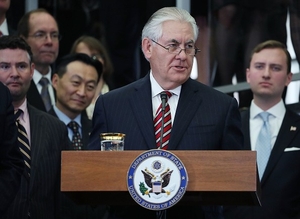Washington, DC - In recent media stories, there has been a flurry of excitement among the fluttering class prompted by a State Department spokesman’s comment that morale is poor at State.
The announcement is as dramatic as “The sun rose in the east this morning” or “It was really hot and humid in Washington this summer.”
Drawing on 50 years of experience with State, both on active duty and as a retired officer, I can say that there has never/never been a period when one could say that morale at State was good, let alone excellent.
Indeed, the standard experience for entering Foreign Service Officers was to hear from older/more senior officers how bad morale is/was at State.
At one point, there was a description of young FSOs departing State as having been smart enough to get in and wise enough to get out.
Nevertheless, State’s retention rate has remained remarkably high over the decades—partly driven by the appreciation of diplomatic elitism and the rare opportunity to practice (or at least participate in the creation/execution of) the foreign policy of the world’s most powerful nation. You don’t do that working for Intel, Bechtel, or Exxon.
So why are State personnel afflicted by its latest bout of poor morale? Partly because they don’t think they are loved (and respected) in the manner they should be. Partly from fear a substantial number of positions, particularly at senior levels, will never be filled--the consequent constriction of job and career opportunities.
L there is also delayed appreciation that it really wasn’t smart for 900 State Department members to sign and then leak a “dissent” to the president’s initial policy on immigrants and refugees. This only reinforced the president’s and concurrently Secretary Tillerson’s conclusion that State was not trustworthy. As if he didn’t already know that State probably voted 90 percent for Secretary Clinton.
Nor do we seem to have learned from this debacle. Still another dissent channel cable was “leaked”—this one accusing Secretary Tillerson of violating the law demanding action against states (Afghanistan, Iraq, Burma) employing “child” soldiers (those under 18 years old). It was a “gotcha” exercise. One had to read deeply into the media story to find the executive branch could issue waivers for such requirements.
What State is facing is leadership that having examined the staffing pattern found it bloated.
 Indeed, when tasked with the large number of unfilled government positions, earlier this year a spokesman reportedly said the Administration did not intend to fill an unspecified number of them. To be sure, State may be regarded as open to reduction. With one organizational chart listing 63 bureaus or offices, seven Special Envoys, 16 Special Representatives, seven Ambassadors at Large, 15 Coordinators, seven Special Advisors, one senior Advisor, one Senior Official, one Personal Representative, and one Senior Representative, pruning is likely.
Indeed, when tasked with the large number of unfilled government positions, earlier this year a spokesman reportedly said the Administration did not intend to fill an unspecified number of them. To be sure, State may be regarded as open to reduction. With one organizational chart listing 63 bureaus or offices, seven Special Envoys, 16 Special Representatives, seven Ambassadors at Large, 15 Coordinators, seven Special Advisors, one senior Advisor, one Senior Official, one Personal Representative, and one Senior Representative, pruning is likely.
The perspective over a generation has seen bureau leadership virtually always including “political” deputy assistant secretaries. Their value added was not always obvious.
And so far as working vigorously to address the challenges of crises around world, an absurd amount of time was devoted in morning frenzies of drafting/clearing “guidance” for the Department of State’s official spokesperson or “briefing” for senior officials. At one point, it rose to 22 clearances, which you might surmise, detracted from other work.
In now approaching a year, following is quick appraisal of USG foreign policy:
The Middle East Israel/Palestinian deadlock remains unresolved (no “Gordian knot” cutter has appeared). Still, the war in Syria is essentially over; ISIS has been defeated in Syria and Iraq;
Stalemate persists in Afghanistan;
Pyongyang’s nuclear/ballistic missile program continues unabated—just as under previous administrations. Very strong language has ensued from USG and Pyongyang—but there have not been further nuclear tests;
Visits to China have resulted in love fests, but with no hard results regarding trade or productive diplomatic intervention with Pyongyang;
“Reset” with Russia has failed—just as it did under Presidents Bush and Obama. Relations look case-by-case (Syria, Ukraine, INF Treaty violations) colored by still divisive investigations over Russian intervention in the 2016 election;
NATO has been put on notice to “do more” for its own defense—long overdue admonitions to free loaders; and
Rejection of assorted trade policies and environmental treaties coincident with commitment to rewrite NAFTA to USA benefit.
Indeed, modern technology makes it possible to conduct key negotiations, directed by NSC staff or small, specially created teams, independent of significant contact or coordination/clearance with other USG elements. Coincidentally, the president can pick up the telephone and speak directly to almost any foreign leader without bothering to coordinate—or even inform—the Secretary of State.
So there are many reasons for the current bout of “poor morale” and none subject to resolution.

























Comments
Please login to post comments.